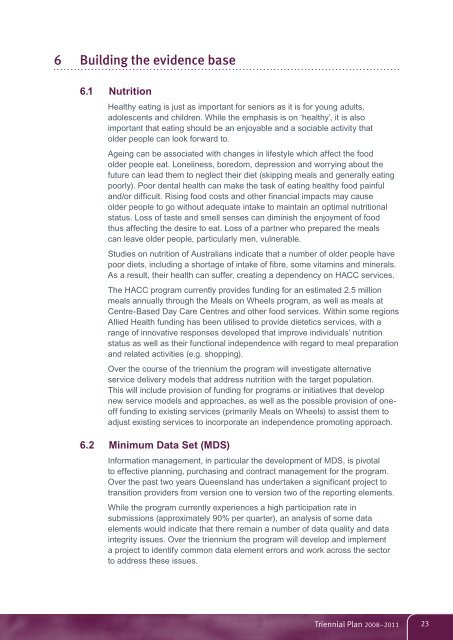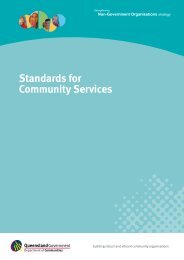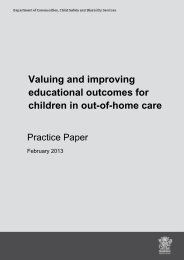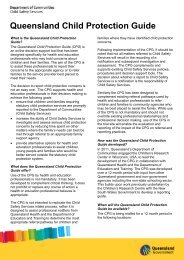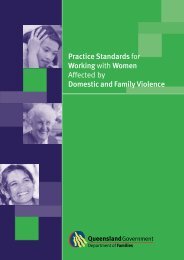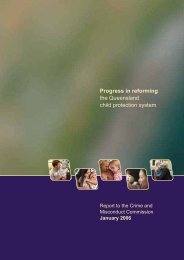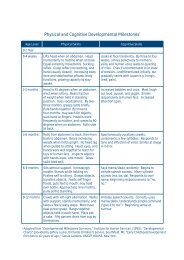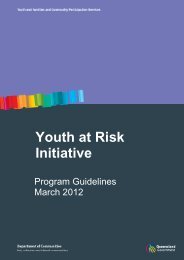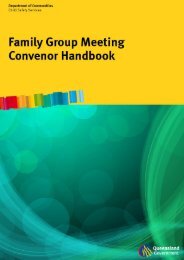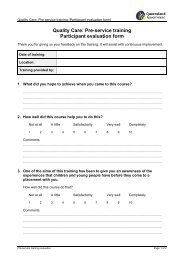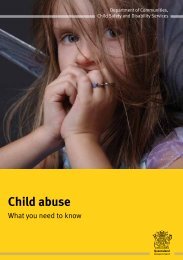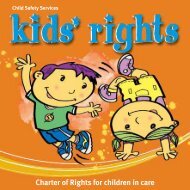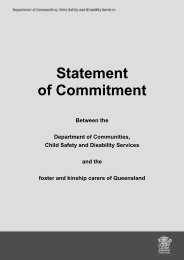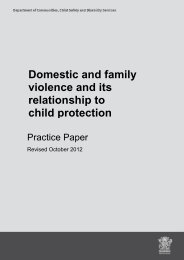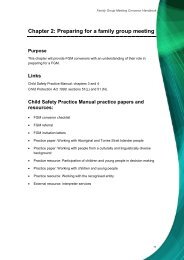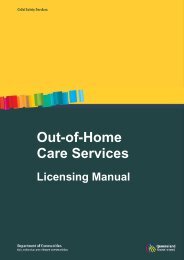Triennial Plan: Home and Community Care Queensland 2008-2011
Triennial Plan: Home and Community Care Queensland 2008-2011
Triennial Plan: Home and Community Care Queensland 2008-2011
Create successful ePaper yourself
Turn your PDF publications into a flip-book with our unique Google optimized e-Paper software.
6 Building the evidence base<br />
6.1 Nutrition<br />
Healthy eating is just as important for seniors as it is for young adults,<br />
adolescents <strong>and</strong> children. While the emphasis is on ‘healthy’, it is also<br />
important that eating should be an enjoyable <strong>and</strong> a sociable activity that<br />
older people can look forward to.<br />
Ageing can be associated with changes in lifestyle which affect the food<br />
older people eat. Loneliness, boredom, depression <strong>and</strong> worrying about the<br />
future can lead them to neglect their diet (skipping meals <strong>and</strong> generally eating<br />
poorly). Poor dental health can make the task of eating healthy food painful<br />
<strong>and</strong>/or difficult. Rising food costs <strong>and</strong> other financial impacts may cause<br />
older people to go without adequate intake to maintain an optimal nutritional<br />
status. Loss of taste <strong>and</strong> smell senses can diminish the enjoyment of food<br />
thus affecting the desire to eat. Loss of a partner who prepared the meals<br />
can leave older people, particularly men, vulnerable.<br />
Studies on nutrition of Australians indicate that a number of older people have<br />
poor diets, including a shortage of intake of fibre, some vitamins <strong>and</strong> minerals.<br />
As a result, their health can suffer, creating a dependency on HACC services.<br />
The HACC program currently provides funding for an estimated 2.5 million<br />
meals annually through the Meals on Wheels program, as well as meals at<br />
Centre-Based Day <strong>Care</strong> Centres <strong>and</strong> other food services. Within some regions<br />
Allied Health funding has been utilised to provide dietetics services, with a<br />
range of innovative responses developed that improve individuals’ nutrition<br />
status as well as their functional independence with regard to meal preparation<br />
<strong>and</strong> related activities (e.g. shopping).<br />
Over the course of the triennium the program will investigate alternative<br />
service delivery models that address nutrition with the target population.<br />
This will include provision of funding for programs or initiatives that develop<br />
new service models <strong>and</strong> approaches, as well as the possible provision of oneoff<br />
funding to existing services (primarily Meals on Wheels) to assist them to<br />
adjust existing services to incorporate an independence promoting approach.<br />
6.2 Minimum Data Set (MDS)<br />
Information management, in particular the development of MDS, is pivotal<br />
to effective planning, purchasing <strong>and</strong> contract management for the program.<br />
Over the past two years Queensl<strong>and</strong> has undertaken a significant project to<br />
transition providers from version one to version two of the reporting elements.<br />
While the program currently experiences a high participation rate in<br />
submissions (approximately 90% per quarter), an analysis of some data<br />
elements would indicate that there remain a number of data quality <strong>and</strong> data<br />
integrity issues. Over the triennium the program will develop <strong>and</strong> implement<br />
a project to identify common data element errors <strong>and</strong> work across the sector<br />
to address these issues.<br />
<strong>Triennial</strong> <strong>Plan</strong> <strong>2008</strong>–<strong>2011</strong> 23


